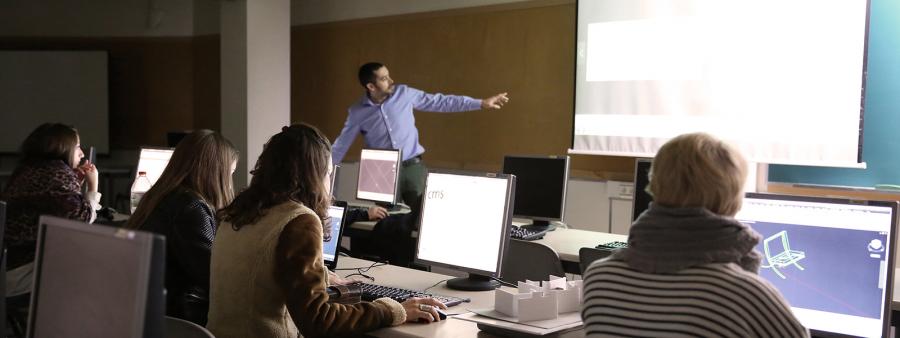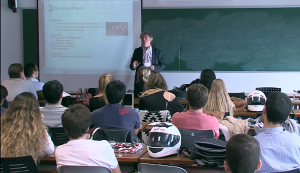10 December 2013 | Posted by Students of Business and Technology
The OECD: Leading the way in Economic, Environmental, and Social Development!

The Organisation for Economic Co-operation and Development (OECD), is an organisation whose mission is to promote policies that will improve the economic and social well-being of people around the world. Guest Speaker Series Part 3. Interviewee: Rory Clarke - Editor-in-Chief of the OECD magazine in Paris. Subject: The role of the OECD in global politics.
 Luke: How long have you been working for OECD and what exactly is you role within the organisation? Rory: My position within the OECD is director of Public Affairs and Communications (PAC), which is a department made up of three devisions that include a publishing devision, which produces around 400 titles a year, a media devision which is responsible for putting out press releases and seminars around the world, and a public affairs division which organisers meetings, forums, and relations with civil society. My role in all of that is I run what we call Corporate Editorial, so I run our public magazine, which is a quarterly magazine called the OECD Observer, the annual report, the year book, policy briefs, and information which is used and sent to policy makers and the public. Luke: Can you tell me a bit about some of the projects and countries you are currently working with? Rory: Well every member country gets an economic survey at least every two years if not every year. We just put out a country survey on Brazil, which is not a member but an official partner. We also recently announced that we are currently in talks with Colombia and Latvia over joining the OECD. A big initiative that we just launched in early October is the OECD skills strategy. The skills strategy is for adults between the ages of 18 and 25, and that has already been issued and has some interesting results of where countries stand in their competencies and skills of their young adult population. Also the OECD economic Outlook will be issued at the end of November. We are also doing a lot of work on gender equality which of course is a big issue at the moment. Luke: What are the advantages for a country of joining the OECD? Rory: First of all, one of the main advantages of joining the OECD is that it shows that you are serious about the ambitions of where your country is heading in terms of economic status, its social status, and its general well-being within the global economy. Its a statement about where you want to be and where you want to go. But it's not easy to join the OECD, it can be quite a long and difficult process depending on the country and their current situation. It also comes at an expense that will have to be covered through taxes. Russia for example has some issues it has to deal with before it is able to join the OECD, and its an ongoing process over a lengthy period of time. But this is not necessarily a bad thing. It means they are changing, they are adapting, and they are taking on board the conditions that are required to become a member of the OECD. And there are concrete benefits of joining the OECD. We have found that members of the OECD tend to be able to access capital and gain international credit more easily. It can quadruple your financial rating, and there are cases when countries have gone from being a C- , to a AAA almost overnight. Being a member of the OECD enables you to exchange views and learn from other countries in terms of policy issues. Dealing with policies is a difficult job if your running a educational department or the health services of your country, and its very useful to know what other countries are doing because all of our countries have encountered the same or similar problems. By joining the OECD you gain access to other countries, to research papers, to a whole process of dialogue and exchange, which if your not a member you cannot gain full availability to. The OECD is 50 years old, it has produced a lot of instruments in economic, social, and environmental policy. And if you join you adopt those policies, and these policies are intended to help strengthen your performance as a country. The OECD is often called the rich mans club of developed countries. That can be a strength in the sense that these countries are at a high level of development, and encountering the kind of problems that highly developed countries would encounter.Israel is a great example, who joined in 2011. Israel has one of the poorest populations in the world. They have been bringing in a lot of expertise to figure out how they can bring up the living standards of very ideologically conservative Hasidic jews, without rocking the boat ideologically speaking. In return, Israel is one of the most technologically innovative countries in the world, and lots of our members have been going over to Israel to find out how they are doing it. How do they invest in their R&D, and how is it they are able to produce some of the finest technology in the world in Israel. What are they doing in their education system to create this? Both parties can benefit from this, and this is what the OECD wants.
Luke: How long have you been working for OECD and what exactly is you role within the organisation? Rory: My position within the OECD is director of Public Affairs and Communications (PAC), which is a department made up of three devisions that include a publishing devision, which produces around 400 titles a year, a media devision which is responsible for putting out press releases and seminars around the world, and a public affairs division which organisers meetings, forums, and relations with civil society. My role in all of that is I run what we call Corporate Editorial, so I run our public magazine, which is a quarterly magazine called the OECD Observer, the annual report, the year book, policy briefs, and information which is used and sent to policy makers and the public. Luke: Can you tell me a bit about some of the projects and countries you are currently working with? Rory: Well every member country gets an economic survey at least every two years if not every year. We just put out a country survey on Brazil, which is not a member but an official partner. We also recently announced that we are currently in talks with Colombia and Latvia over joining the OECD. A big initiative that we just launched in early October is the OECD skills strategy. The skills strategy is for adults between the ages of 18 and 25, and that has already been issued and has some interesting results of where countries stand in their competencies and skills of their young adult population. Also the OECD economic Outlook will be issued at the end of November. We are also doing a lot of work on gender equality which of course is a big issue at the moment. Luke: What are the advantages for a country of joining the OECD? Rory: First of all, one of the main advantages of joining the OECD is that it shows that you are serious about the ambitions of where your country is heading in terms of economic status, its social status, and its general well-being within the global economy. Its a statement about where you want to be and where you want to go. But it's not easy to join the OECD, it can be quite a long and difficult process depending on the country and their current situation. It also comes at an expense that will have to be covered through taxes. Russia for example has some issues it has to deal with before it is able to join the OECD, and its an ongoing process over a lengthy period of time. But this is not necessarily a bad thing. It means they are changing, they are adapting, and they are taking on board the conditions that are required to become a member of the OECD. And there are concrete benefits of joining the OECD. We have found that members of the OECD tend to be able to access capital and gain international credit more easily. It can quadruple your financial rating, and there are cases when countries have gone from being a C- , to a AAA almost overnight. Being a member of the OECD enables you to exchange views and learn from other countries in terms of policy issues. Dealing with policies is a difficult job if your running a educational department or the health services of your country, and its very useful to know what other countries are doing because all of our countries have encountered the same or similar problems. By joining the OECD you gain access to other countries, to research papers, to a whole process of dialogue and exchange, which if your not a member you cannot gain full availability to. The OECD is 50 years old, it has produced a lot of instruments in economic, social, and environmental policy. And if you join you adopt those policies, and these policies are intended to help strengthen your performance as a country. The OECD is often called the rich mans club of developed countries. That can be a strength in the sense that these countries are at a high level of development, and encountering the kind of problems that highly developed countries would encounter.Israel is a great example, who joined in 2011. Israel has one of the poorest populations in the world. They have been bringing in a lot of expertise to figure out how they can bring up the living standards of very ideologically conservative Hasidic jews, without rocking the boat ideologically speaking. In return, Israel is one of the most technologically innovative countries in the world, and lots of our members have been going over to Israel to find out how they are doing it. How do they invest in their R&D, and how is it they are able to produce some of the finest technology in the world in Israel. What are they doing in their education system to create this? Both parties can benefit from this, and this is what the OECD wants.
Add new comment